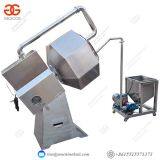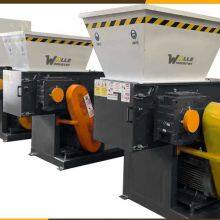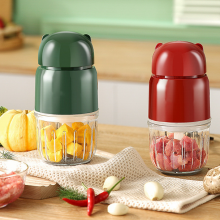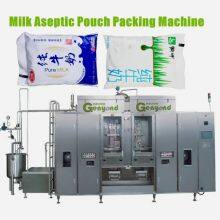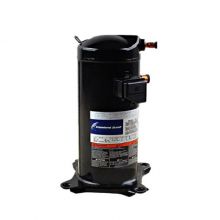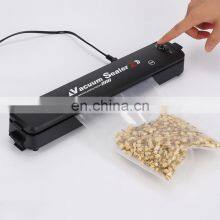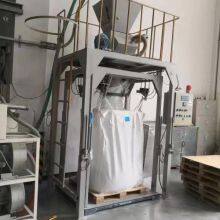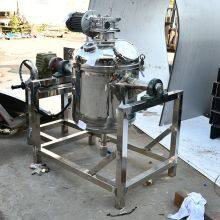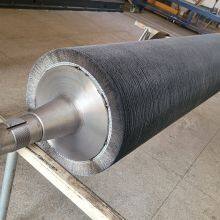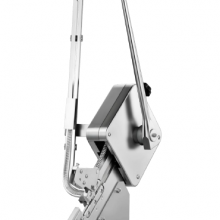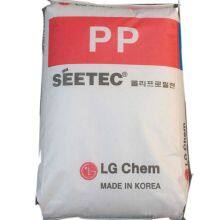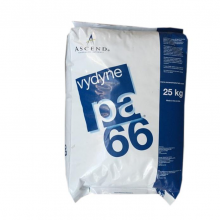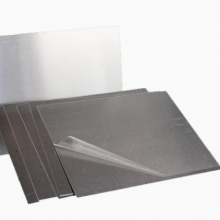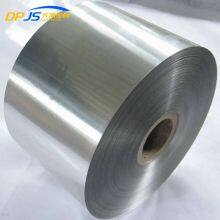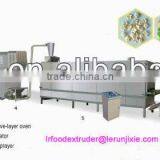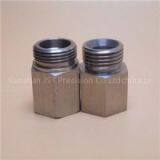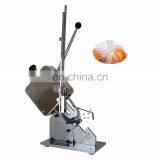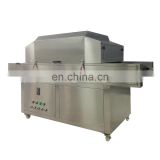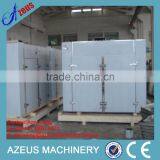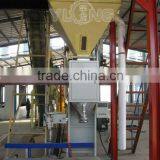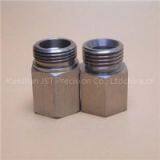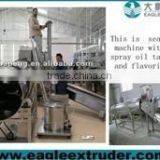The landscape of food production has been undergoing a major shift due to advancements in food machine technology. Food machines have revolutionized the packaging of foodstuffs and the processing of food, and very much seem to be one of the promising means to cater to the demands of the growing food industry. From mega-factories down to small kitchen setups, food machinery has increasingly become a prerequisite while ensuring efficient, consistent, and excellent-quality food production. As the new technologies and their applications in food manufacturing evolve, new avenues and challenges arise that will shape the course that ocean food manufacturing will take shortly.
Food machines are big equipment used in food processing and production at different stages. Before food machinery was invented, people performed many jobs manually time-consuming process. Manufacturing food machines improved the efficiency and quality of food production. Food machinery includes all machinery and equipment, ranging from forming machines, slicers, mixers, and packaging machines to others. These machines are used in processing for improving production time, reducing labor, and limiting mistakes by humans. When combined with advanced technology, food machines allow processes to operate with precision and speed, which is important for commercial and industrial operations.
Food machinery includes mixers, slicers, grinders, ovens, packaging machines, forming machines, refrigeration equipment, and conveyors.
Mixers: Combine ingredients efficiently.
Slicers: Precisely cut food into uniform pieces.
Grinders: Break down food into finer textures.
Ovens: Cook or bake food at controlled heat.
Packaging Machines: Automate wrapping or sealing.
Forming Machines: Shape food into desired forms.
Refrigeration Equipment: Preserve food via cooling.
Conveyors: Transport food across production lines.
The existence of a few prominent players marked the food machinery market. They are also known for their innovative solutions and peak manufacturing standards. A number of companies, leading manufacturers, and suppliers from China, Europe, and the United States are coming up with better technologies for food processing machines. Being technically specialized in stainless steel and electric food machines, they offer a full-fledged solution to food processing, starting from snack production to pet food processing. These manufacturers design multifunctional and energy-efficient equipment catering to the many requirements of the global food industry. Due to their concentration on quality and innovation, the latest developments in food machinery technology are from their side, which businesses can avail at factory price.
In the present globalized scenario, large-scale manufacture and packaging of food must stand in allied directions with demand. Great emphasis is placed on advanced machinery for efficiency, precision, and consistency is placed upon. It is no longer a human-oriented operation, where state-of-the-art machinery now mixes ingredients, cooks, packages, and labels, reducing the operationally costly implications of human involvement. Thus, heavy emphasis is on automation and sustainability for large-scale production. Companies investing in energy-efficient systems and sustainable packaging solutions do so in accordance with their consumer expectations as well as environmental regulations. Such promulgation of innovation, consumer demands, and global sustainability initiatives is strongly woven into one another.
Small-scale artisanal food businesses have now gained popularity, motivated mainly by consumer preferences for sustainable, high-quality, and locally made products. This can specifically be traced back to the newfound consumer desire to support local economies and indulge in unique flavors, coupled with the stories behind these products. These businesses leverage online platforms and social media in order to target their niche markets, focusing on authenticity and a personal connection with the customer. The very question remains: How are these businesses surviving while competing with bigger enterprises? The answer-frontier lies in the ability to specialize through customizations, sustainable practices, and strongly motivated customer communities that value ethically produced and high-quality products over mass-produced items.
Food equipment is pivotal for the production of different categories of products- from traditional snacks to cutting-edge vegan products. For snack production operators, the various equipment includes 5000 automatic frying machines, potato chip making machines, and candy forming machines name just a to ensure maximum output of key units such as chips, crackers, and sweets. For the growing vegan market, food processing equipment becomes extremely important in the product development of plant-based alternatives for meat and ice cream. The machines provide the processing levels of mixing, forming, and cooking with all the fine details required to attain the desired textural and flavor properties of conventional foods. As consumer choices shift towards healthier and sustainable options, using the latest food technology provides producers with a way to meet this demand while ensuring a guarantee of efficiency and consistency across all their product lines.
This investment can save costs and increase output for food producers. The machines work to process food and automate its many stages of production, thereby capitalizing on less labor. Automatic forming operations and slicing would be just some of the examples meant for carrying large volumes of ingredients, such as meat and vegetables, into high-scale production-line processes. Food machinery can, therefore, provide great precision and speed, yielding a high degree of productivity, which means that manufacturers can make more units in less time. At the same time, under tremendous food demand, factories can go ahead and supply food products without much operational cost. Cost efficiency then translates into profits and puts the company a step ahead in a fast, discrete industry like food.
The food machines offer improved product quality and have some of the most important advantages. The integration of advanced technology ensures that every single unit produced complies with stringent quality standards. For instance, food processing machines such as mixers and cookers will sufficiently mix and cook ingredients, which is crucial to the taste and texture of sauces, biscuits, and candy. Such machines also offer hygiene-friendly stainless steel components; in this aspect, hygiene is paramount while working in the food industry. Besides that, automatic packing solutions will also help keep products fresh, extend the shelf life of snacks, and potato chips. Hence, customer requirements for good quality food products are on the rise, making food machinery increasingly important in ensuring product consistency and quality.
The machine increases the level of accuracy in the operation by reducing human error in production processes. When automatic systems are activated from slicing to dicing to packaging, there is only a slight possibility of error. By way of example, electric slicers and dicing machines cut vegetables and meats to precise specifications, ensuring uniformity and quality in every batch. This precision is essential to maintaining the consistency of the products, something that manual processes generally fail at. Additionally, machines ensure waste and rework are kept low with their advanced controls that maintain production parameters optimally. Reducing human errors makes manufacturers a more efficient and reliable brand, to the satisfaction of their customers.
The initial investment cost is often the first major hurdle in integrating food machinery into manufacturing processes. These advanced food processing machines, such as forming machines and slicers, require heavy investments from producers. This puts small and medium-sized firms having to compete in the large-scale arena of food production at a disadvantage. Unlike most equipment, the purchase of high-grade machinery from reputable brands in China or any other industrial center is a formidable undertaking. Custom solutions for certain processing needs further elevate these initial costs. Businesses will have to analyze whether their expected output increase, savings in labor, or long-term efficiency pay off adequately to make that initial huge expense worthwhile.
And this is another key hindrance that arises, in many cases, for businesses to the integration of food machines into their production lines: maintenance requirements and specialized training. With highly automatic and sophisticated machines, maintenance must be carried out regularly to guarantee performance and extend their life. This will consequently add to the costs, and technical expertise might not be available in-house. Hence, businesses will have to invest in training their employees to enable them to operate and maintain the machines effectively. Finding an expert technician for such equipment as electric forming machines and multifunctional mixers is indeed difficult. Therefore, it is paramount that businesses set up maintenance programs and training schedules to ensure maximum productivity with minimal downtime.
The environment food machinery manufacturers see themselves having to operate in is one of rapid evolution, of cutthroat competition, and something that has to keep pace with technological change. In the space of food machines, new technologies are being developed as fast as consumers demand new products-may they be vegan products or gourmet snacks introduced manufacturers are being forced to adapt to these quickly. Companies must remain agile in the adoption of the newest advancements in automation and smart technologies in order to enhance productivity and meet the demands of the market. The possible negative impact arises as a burden to existing resources, for having new equipment involves a simultaneous integration process with existing production lines. Further, because the whole process must continue to invest in research and development so as to be able to innovate and provide solutions, such as energy-efficient designs and deliver customizable production capabilities, this puts a heavy strain on remaining resources as well.
A food machine is a device designed to automate the preparation, processing, or cooking of food. These machines come in various forms, such as automatic cutters, slicers, and fryers. They streamline operations in both home kitchens and commercial settings, enhancing efficiency and consistency. For instance, a vegetable cutter can quickly chop ingredients, while a meat cutter ensures uniform slices for cooking. With the right food processing machines, you can save time and improve the quality of your meals.
A food vacuum machine is essential for preserving freshness and extending the shelf life of various food items. By removing air from packaging, it prevents oxidation and bacterial growth, making it ideal for storing meat, fruits, and even snacks like chips. These machines are often used in commercial food production lines to ensure products remain high quality during distribution. Additionally, vacuum sealing can help maintain the flavor and texture of foods, whether you're freezing or refrigerating them. Investing in a food vacuum machine is a smart solution for both home cooks and industrial kitchens.
Commercial food-making machines offer numerous advantages for businesses involved in food production. They increase efficiency by automating repetitive tasks such as mixing, chopping, and baking, significantly reducing labor costs. High-quality machines can handle large volumes, making them perfect for factories and production lines. Furthermore, they ensure consistency in taste and presentation, which is crucial for customer satisfaction. Investing in a reliable food-making machine can ultimately lead to enhanced productivity and profitability for your business.
Absolutely! Many food machines are specifically designed for making snacks such as cookies, chips, and crackers. For instance, a cookie maker can streamline the mixing and shaping process, while a chips production line can efficiently fry or bake potato chips to perfection. Additionally, machines like dicers and cutters can help prepare ingredients quickly and uniformly, ensuring that every snack is delicious and visually appealing. With the right food processing equipment, you can elevate your snack-making game and meet consumer demands.
When searching for a high-quality food machine, consider features such as durability, ease of use, and versatility. Look for machines made from stainless steel or other robust materials, as they tend to withstand heavy use better. A multifunctional machine that can perform various tasks—like chopping, slicing, and mixing—can offer great value. Additionally, check for safety features, such as automatic shut-off and non-slip bases, to ensure user safety during operation. Finally, consider the machine's capacity and whether it meets your production needs.
Yes, there are many low-cost options available for food processing machines, particularly for small-scale operations or home kitchens. While these machines may not have all the advanced features of high-end models, they can still effectively perform essential tasks such as chopping, slicing, and mixing. Brands often offer mini versions of larger machines, making them more affordable without sacrificing functionality. When shopping for low-cost food machinery, be sure to read reviews and compare specifications to ensure you choose a reliable and efficient model.
